(ENG-SPA) Review: TURNING RED 🐼🍁❤️ Be yourself and don’t hold back for anyone

FUENTE1-SOURCE1 -FUENTE2-SOURCE2
Al principio, esta película no llamó mi atención, ya que sentí que el tráiler no le hizo justicia y vendió mal la trama. Vi que fue más criticada que aclamada, con opiniones que la tildaban de "cringe", inapropiada e incluso desconectada del público. Sin embargo, al verla, descubrí que la trama real era muy distinta a lo que el tráiler mostraba y que, en realidad, es una gran película.
At first, this movie didn't catch my attention as I felt the trailer didn't do it justice and misrepresented the storyline. I noticed it was more criticized than praised, with opinions describing it as "cringe," inappropriate, and even disconnected from the audience. However, after watching it, I realized the actual plot was far from what the trailer portrayed, and it is, in fact, a great film.
• TRAMA • 🍁🐼🌕 • PLOT •
Ambientada en 2003, la historia sigue a Mei Ling Lee, una inteligente niña chino-canadiense de 13 años que comienza a transformarse en un panda rojo al experimentar emociones fuertes, debido a un antiguo pacto familiar. Con la ayuda de sus amigas, Mei intenta aprender a gestionar sus emociones y su transformación. Mientras enfrenta la presión y expectativas familiares y busca definir su identidad, valorarse y encontrar el coraje para ser ella misma.
Set in 2003, the story follows Mei Ling Lee, a smart Chinese-Canadian 13-year-old who begins to transform into a red panda whenever she experiences strong emotions, due to an ancient family pact. With the help of her friends, Mei tries to learn how to manage her emotions and her transformation. She faces familial pressure and expectations while seeking to define her identity, value herself, and find the courage to embrace who she truly is.
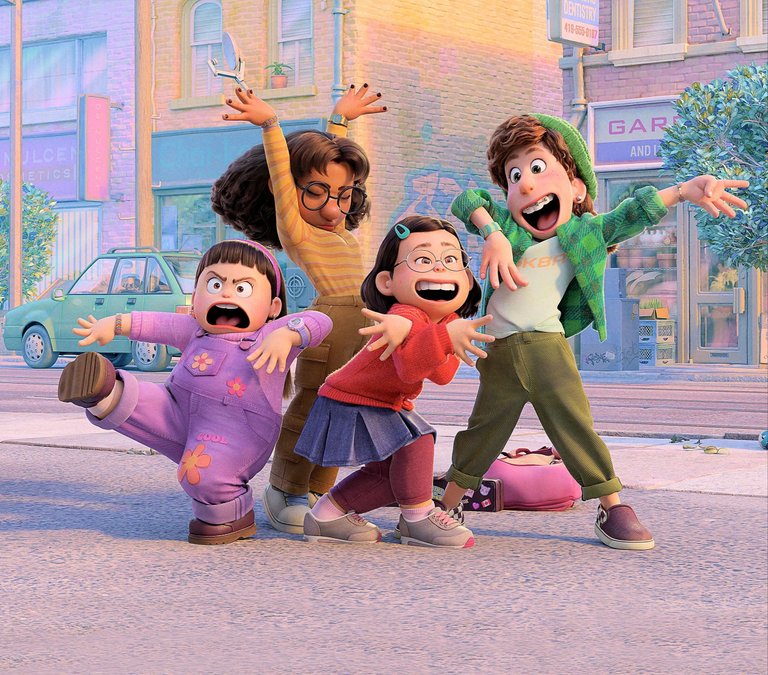
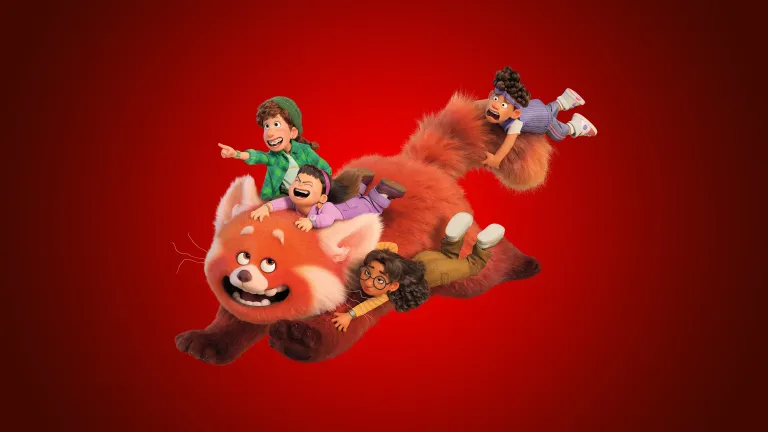
FUENTE-SOURCE1. FUENTE-SOURCE2
• DESARROLLO Y ANÁLISIS • 🍁🐼🍁 • DEVELOPMENT AND ANALYSIS •
Mis interpretaciones y opiniones sobre ciertos temas o aspectos que considero muy destacables dentro de los sucesos que ocurren en la película.
My interpretations and opinions on certain themes or aspects that I find particularly remarkable within the events of the movie.
• Control y expectativas hacia Mei por parte de su madre • ⛓️🔒• Control and Expectations Towards Mei from Her Mother •
Mei parece una chica segura y espontánea, pero las expectativas altas y rígidas de su madre Ming, ejercen control constante sobre ella. Aunque Mei cree que es muy independiente, en realidad su independencia está muy influenciada por las decisiones de sus padres.
Mei appears confident and spontaneous, but the high and rigid expectations of her mother, Ming, exert constant control over her. Although Mei believes she is independent, her independence is heavily influenced by her parents' decisions.

Ming supervisa cada aspecto de su vida, desde sus calificaciones hasta sus actividades diarias, dejando poco espacio para que Mei explore su independencia.
Ming monitors every aspect of her life, from her grades to her daily activities, leaving little room for Mei to explore her own autonomy.
Mei alega que honrar a sus padres es lo mínimo que podemos hacer siendo que ellos nos dieron la vida... pero el concepto de honrar que tiene es el de "hacer absolutamente todo lo que te digan" y siento que también eso incluye cumplir con todo lo que esperan de ti, por lo que advierte que "honrar" demasiado a tus padres puede hacer que te olvides de ti mismo.
Mei claims that honoring your parents is the least we can do since they gave us life. However, her concept of honoring them seems to be "doing absolutely everything they tell you," which also includes fulfilling their expectations. She warns that over-honoring your parents might make you forget about yourself.
• Necesidad de aprobación y miedo al rechazo • 💯🤐 • Need for Approval and Fear of Rejection •
Mei busca constantemente la aprobación de sus padres, colocando sus deberes, responsabilidades y obligaciones por encima de todo y dedicando casi todo su tiempo a ello, sacrifica momentos importantes de su vida, como pasar tiempo con sus amigas, para asegurarse de que su madre esté satisfecha con ella.
Mei constantly seeks her parents' approval, prioritizing her duties, responsibilities, and obligations above all else, dedicating almost all her time to them. She sacrifices important moments in her life, like spending time with her friends, to ensure her mother is satisfied with her.
Por lo que a mi parecer su identidad parece más moldeada por los deseos de su madre que por sus propios deseos.
In my opinion, her identity seems more shaped by her mother's desires than by her own.
Incluso al principio oculta sus verdaderos intereses y deseos, cosas diferentes a las expectativas de su madre, como su fanatismo por 4Town y su gusto por los chicos para evitar decepcionarla.
She even hides her true interests and desires, such as her fandom for 4Town and her admiration for boys, to avoid disappointing her mother.
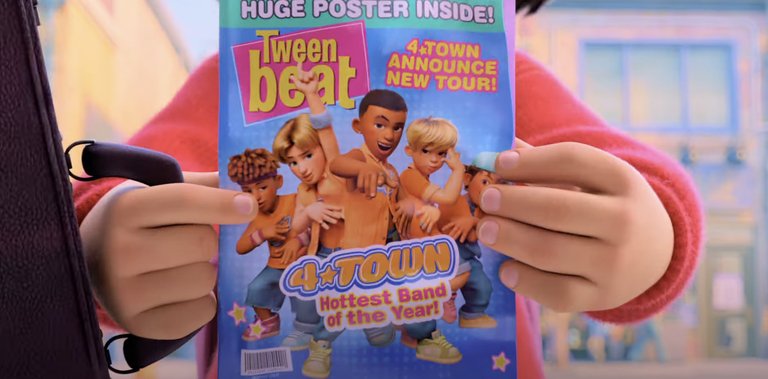
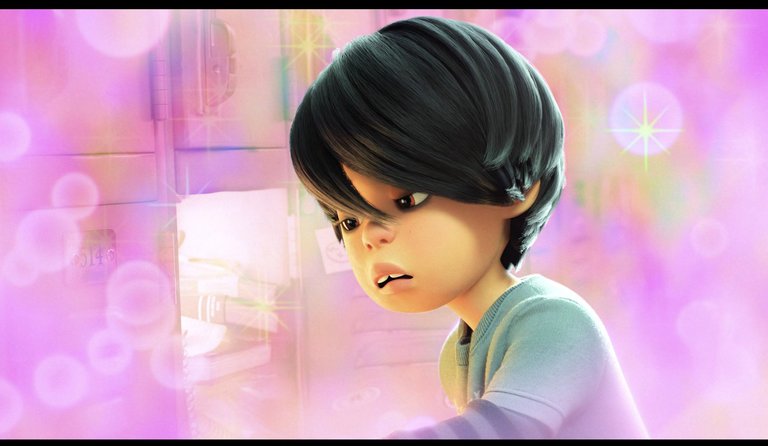
Cuando su madre la avergüenza públicamente por los dibujos románticos que hizo de Devon, (un chico guapo de un minimarket) acusándolo, sin tan siquiera haberse detenido a hablar con Mei sobre eso: Mei se culpa a sí misma en lugar de cuestionarla. Se siente profundamente avergonzada y culpable por su comportamiento y termina castigándose y reprimiendose, sintiendo que no puede fallar ni equivocarse, pues dice que para su madre, ella es su mayor orgullo y por ende debe actuar como tal siempre.
When her mother publicly humiliates her over the romantic drawings she made of Devon (a handsome boy from a convenience store), accusing him without even talking to Mei about it first, Mei blames herself rather than questioning her mother. She feels deeply ashamed of her behavior and ends up punishing and repressing herself, believing she cannot fail or make mistakes. Mei mentions that she is her mother's greatest pride and therefore must always act accordingly.
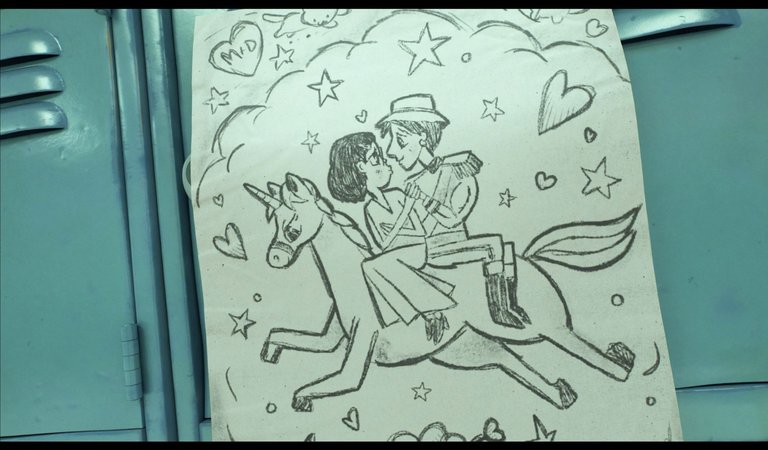
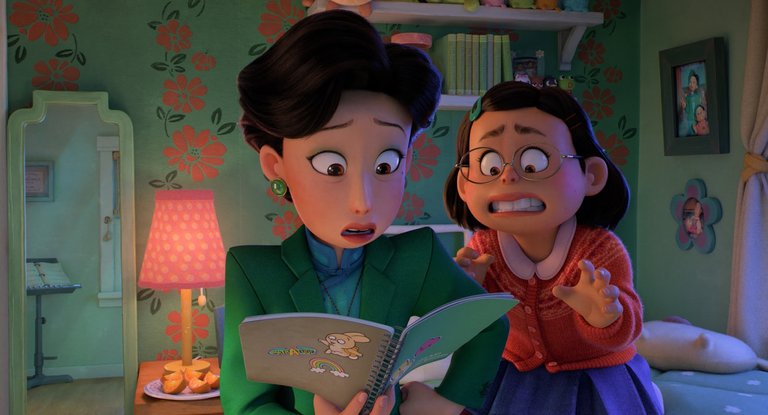
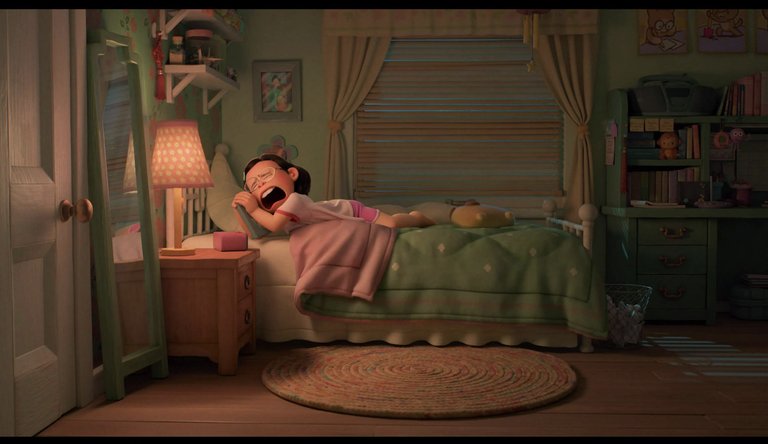
FUENTE-SOURCE1
FUENTE-SOURCE2
FUENTE-SOURCE3
Desde el momento en que Mei Mei despierta transformada en un panda rojo, su mundo se desmorona. No sabe cómo manejarlo, se siente monstruosa y teme el rechazo. Para mí esta transformación no es solo física, sino emocional: al menos yo siento que el panda rojo representa una parte de sí misma que al fin salió a la luz y que intenta reprimir por miedo a ser rechazada.
From the moment Mei wakes up transformed into a red panda, her world falls apart. She doesn't know how to handle it, feels monstrous, and fears rejection. To me, this transformation isn't just physical but also emotional. I feel the red panda symbolizes a part of herself that finally came to light but that she tries to suppress out of fear of being rejected.
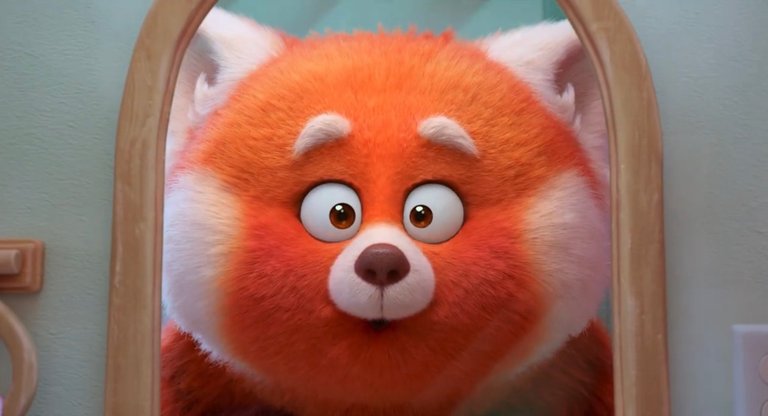
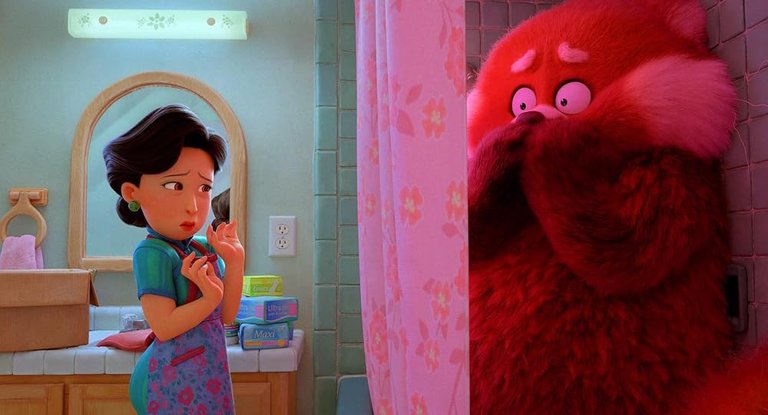
Especialmente por su madre quien, sin saber qué Mei está escuchando, hace comentarios hirientes sobre su apariencia y comportamiento, comparándola con un monstruo frente a su esposo. Lo que sin dudas la afecta profundamente.
Especially by her mother, who, without realizing that Mei is listening, makes hurtful comments about her appearance and behavior, comparing her to a monster in front of her husband. This undoubtedly affects Mei deeply.
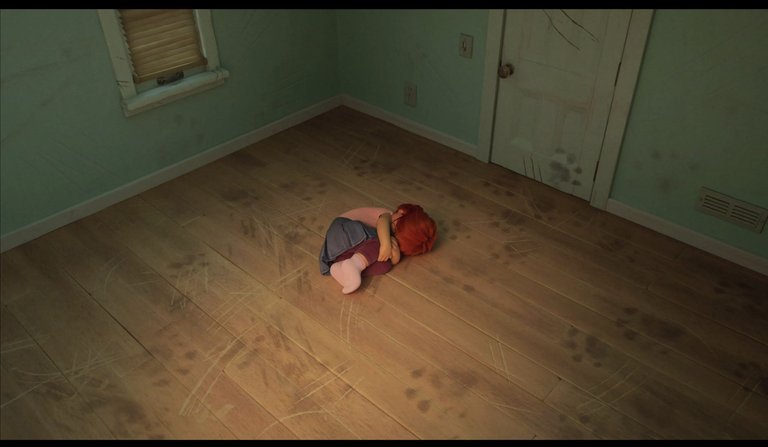
• El amor de Mei por sus amigas • 💚💛💜❤️ • Mei’s Love for Her Friends •
Sus amigas la aceptan con el panda rojo y nunca la ven como un monstruo, sino como algo especial; le dicen y demuestran que la amarán, con o sin panda. Es el tipo de amor incondicional que Mei necesita para sentirse segura y valorada, es por ello que para Mei sus amigas son como su refugio, libre de juicios, en el que puede relajarse y sentirse libre y en paz consigo misma, algo que le ayuda mucho a regular sus emociones y por ende a controlar su transformación.
Her friends accept her with the red panda and never see her as a monster, but rather as something special. They tell her and show her that they will love her, with or without the panda. This kind of unconditional love is what Mei needs to feel secure and valued. For Mei, her friends are like a refuge—free of judgment—where she can relax and feel at peace with herself, something that helps her regulate her emotions and, in turn, control her transformation.
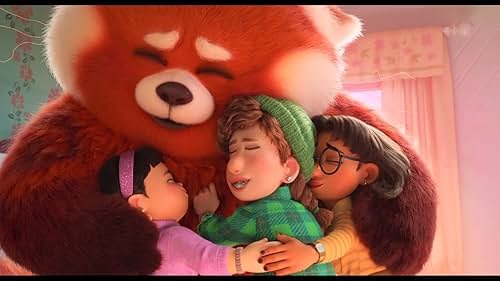
• Un trauma generacional • 💔• A Generational Trauma •
Tanto Ming como su madre (la abuela de Mei) ven al panda con repudio, y le piden a Mei Mei que no lo deje salir pues será más difícil sellarlo (atraparlo en un amuleto, para que no pueda salir más), si lo deja salir todo el tiempo.
Both Ming and her mother (Mei’s grandmother) resent the red panda and warn Mei not to let it out too often, as it will be harder to seal it away (trapping it in an amulet so it won’t come out again).
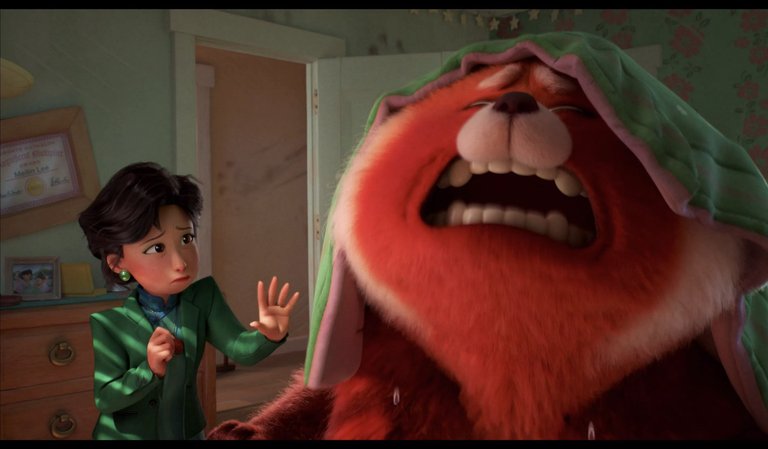
Ambas han culpado al panda rojo por los conflictos familiares, y las grietas dentro de sus relaciones, cuando en realidad, el problema no es la transformación, sino las actitudes y dinámicas tóxicas que han heredado por sus propias acciones, actitudes y decisiones.
They have blamed the red panda for family conflicts and fractured relationships, when in reality, the problem isn’t the transformation itself, but the toxic behaviors and dynamics they have inherited through their own actions, attitudes, and decisions.
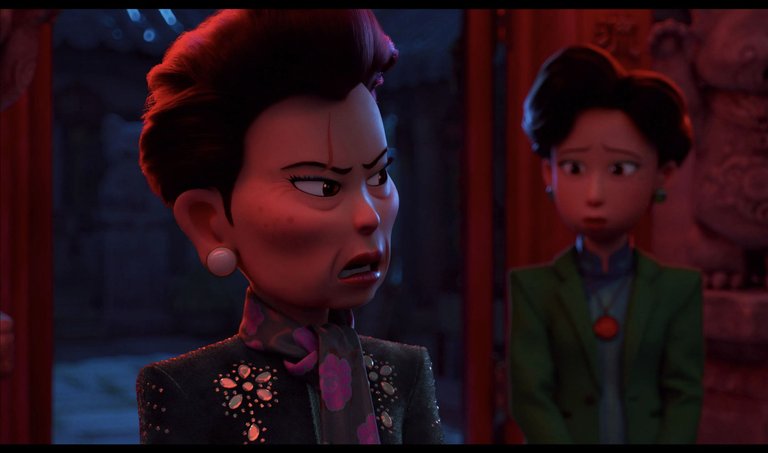
• Necesidad de ser perfecta y frustración • ✨🌪️ • Need for Perfection and Frustration •
Cuando Mei pide permiso para ir al concierto de 4Town, su madre se niega, mostrando nuevamente su desconfianza. La frustración de Mei surge cuando con esto se da cuenta o siente que a pesar de sus esfuerzos por tratar de ser perfecta, nunca será suficiente para cumplir con las expectativas de su madre ni ganarse su confianza.
When Mei asks for permission to go to the 4Town concert, her mother refuses, once again showing her distrust. Mei’s frustration grows as she realizes that, despite her efforts to be perfect, she will never be enough to meet her mother’s expectations or earn her trust.
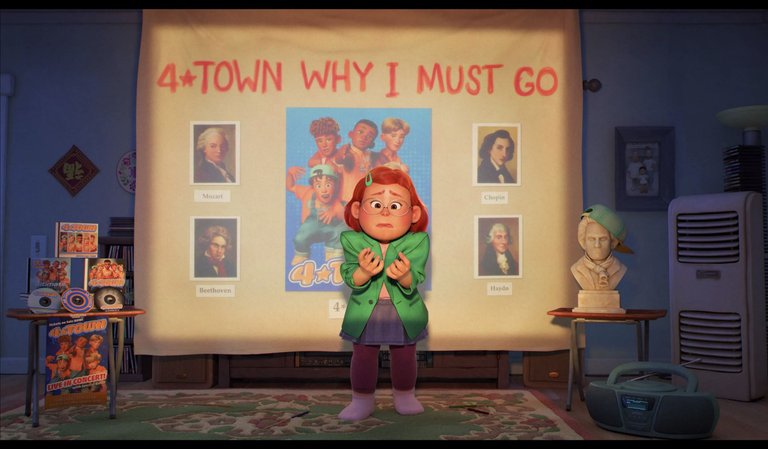
• Expectativas vs. Verdadero yo • Familia vs. Independencia. • 🎭• Expectations vs. True Self • Family vs. Independence •
Mei necesita ser aceptada por su familia, pero también sntirse bien, es por ello que se ve obligada a adaptárse a dos versiones de sí misma, una fuera de casa: libre, divertida y auténtica, y otra en su casa, una hija absolutamente obediente y "perfecta". Fingir ser alguien que no es, ocultar gran cantidad de cosas a sus padres y mentirles.
Mei wants to be accepted by her family but also feel good about herself, leading her to adapt to two versions of herself. Outside her home, she is free, fun, and authentic; at home, she is the obedient and “perfect” daughter. She hides many things from her parents and lies to them to maintain appearances.
Cuando los padres de Mei y sus amigas les niegan el concierto de 4Town, ellas deciden reunir el dinero por su cuenta. Tomando decisiones independientes, aunque no sean las mejores. Mei usa su transformación en panda rojo para ganar dinero, cobrando por fotos, mercancía y abrazos en la escuela. Además acepta ir a la fiesta de Tyler a cambio de dinero para completar lo que les falta para las entradas. Aunque esto les ayuda, también refleja su conflicto interno: aprovecha su panda para alcanzar sus objetivos, pero sigue sintiendo la presión de mantener las apariencias con su madre.
When Mei and her friends are forbidden from attending the 4Town concert, they decide to raise the money themselves, making independent choices, even if they aren’t the best ones. Mei uses her red panda transformation to earn money by selling photos, merchandise, and hugs at school. She also agrees to attend Tyler’s party in exchange for money to complete the amount needed for the tickets. While this helps them, it also highlights Mei’s internal conflict—she uses her panda to achieve her goals but still feels pressured to maintain appearances for her mother.
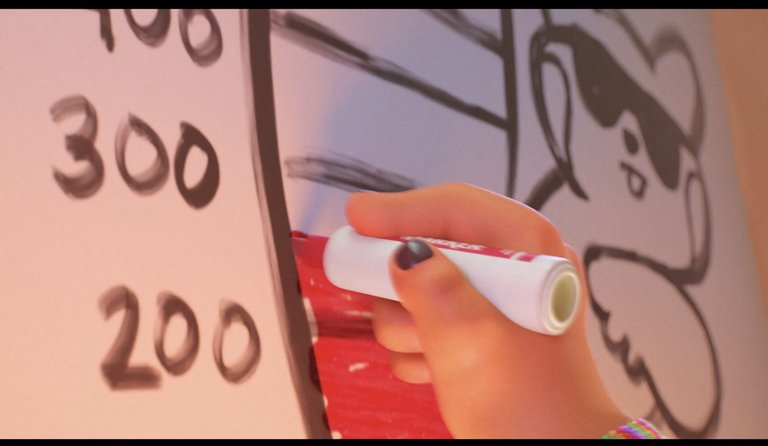
Ming descubre esta dualidad cuando no encuentra a Mei Mei en su cuarto, y encuentra objetos ocultos bajo su cama, desde una calificación de B+, lo que muestra que Mei siente la necesidad de esconderle incluso sus errores más pequeños, hasta los más grandes con aquello que no aprobaría como señales de desobediencia: como merchandising del panda y demás evidencias de que había dejado salir luego de que le habían dicho que no lo hiciera.
Ming uncovers this duality when she doesn’t find Mei in her room and discovers hidden items under her bed. From a B+ grade, which shows Mei feels the need to hide even her smallest mistakes, to objects Ming wouldn’t approve of, such as red panda merchandise and other signs of disobedience—proof that she had let it out despite being told not to.
En la fiesta de Tyler, Mei inicialmente usa al panda para entretener a los invitados, pero la situación se complica cuando Tyler la provoca e insulta, lo que desencadena un ataque de ira en Mei. En su forma de panda, pierde el control y lo ataca, causando caos en la fiesta. La transformación en panda rojo simboliza las emociones intensas de Mei. En este caso, su ira y frustración la llevan a perder el control, mostrando cómo sus emociones reprimidas explotaron de manera destructiva.
At Tyler’s party, Mei initially uses the panda to entertain guests, but the situation escalates when Tyler provokes and insults her, triggering an outburst of rage. In her panda form, she loses control and attacks him, causing chaos at the party. The red panda transformation symbolizes Mei’s intense emotions. In this case, her anger and frustration lead her to lose control, showing how suppressed emotions can explode in destructive ways.
Tyler termina llorando, y la intervención de Ming, quien aparece inesperadamente, empeora la culpa y la vergüenza de Mei.
Tyler ends up crying, and the unexpected arrival of Ming only increases Mei’s guilt and shame.
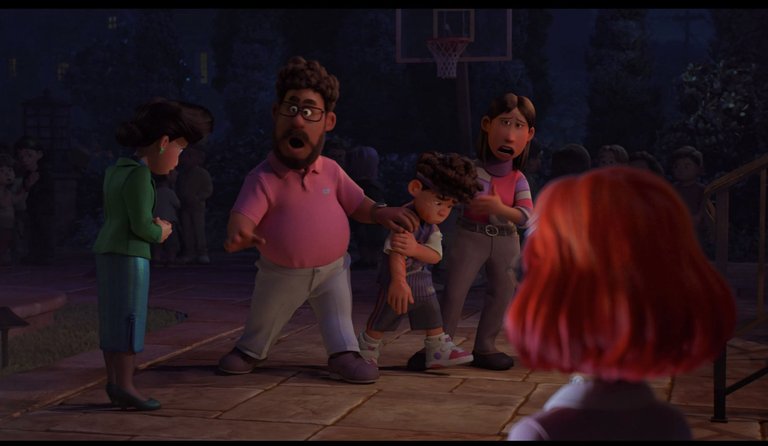
Su madre como siempre mal interpreta las cosas y cree que sus amigas la forzaron y usaron su transformación de panda para obtener lo que querían, expresando que Mei es una niña dulce e inocente y que no haría algo así, lo cual Mei no niega por miedo a su rechazo y a no cumplir con esas expectativas. Por lo que termina poniéndose del lado de su madre, traicionando a sus amigas dejando que las acusen injustamente.
As always, her mother misinterprets the situation, assuming Mei’s friends forced her and exploited her panda form for their own benefit. Ming insists that Mei is a sweet and innocent girl and wouldn’t do something like that, and Mei, afraid of rejection and failing to meet her mother’s expectations, doesn’t deny it. She ultimately sides with her mother, betraying her friends by allowing them to be unfairly blamed.
Es aquí cuando Mei luce más sumisa que nunca, avergonzada termina al igual que su madre: sintiendo rechazo e incluso miedo por el panda, pero también mucha tristeza y vacío por sentir que está rechazando algo importante de sí misma.
This is when Mei looks more submissive than ever. Ashamed, she ends up just like her mother—feeling rejection and even fear toward the panda, but also deep sadness and emptiness from realizing she is rejecting something important about herself.
• El señor Jin. • 🍱✨• Mr. Jin •
Jin es el papá de Mei, un personaje silencioso pero esencial. Aunque rara vez interviene, es el verdadero apoyo de Mei, apreciándola en todas sus facetas. tiene una perspectiva más sana y comprensiva de las situaciones; le habla sobre el panda de su madre y le deja frases clave para su aceptación: "Las personas tienen toda clase de ángulos… A veces hay que aceptar las partes malas y hacerles espacio, aprender a vivir con ellas" También le dice: "El rojo es un color de la suerte." Estas palabras son fundamentales para la percepción de Mei sobre su panda y su identidad.
Jin, Mei’s father, is a quiet yet essential character. Though he rarely intervenes, he is Mei’s true source of support, appreciating her in all her facets. He has a healthier, more understanding perspective on the situation. He talks to Mei about her mother’s panda and shares key phrases that help Mei embrace herself: "People have all kinds of sides… Sometimes you have to make room for the messy parts and learn to live with them." He also tells her, "Red is a lucky color." These words are crucial for Mei’s perception of her panda and her identity.
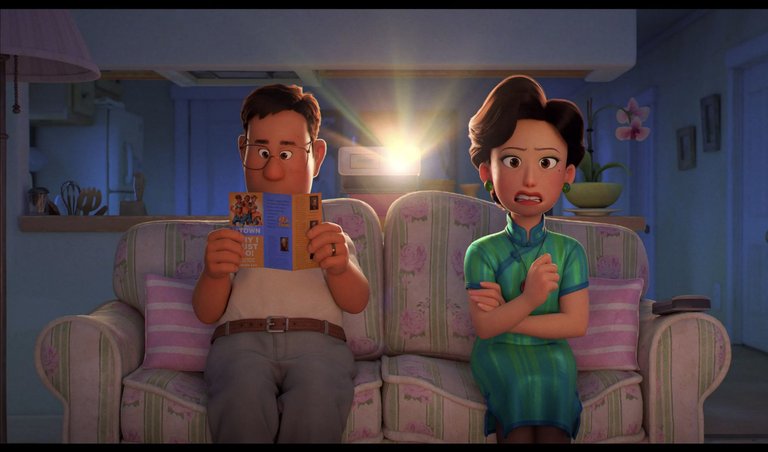
• La reafirmación de Mei como individuo y el descontrol de Ming • 🌋 • Mei’s Reaffirmation as an Individual and Ming’s Loss of Control •
Llega la noche del ritual (la misma noche del concierto de 4Town) para sellar a su panda, pero a último minuto Mei se arrepiente y decide quedarselo, y no tan sólo eso, sino también usarlo para ir al concierto que tanto quería y poder encontrarse y disculparse con sus amigas.
The night of the ritual finally arrives (the same night as the 4Town concert) to seal Mei’s panda, but at the last moment, Mei decides to keep it. Not only that, she uses it to attend the concert she had longed for and to reunite with her friends to apologize.
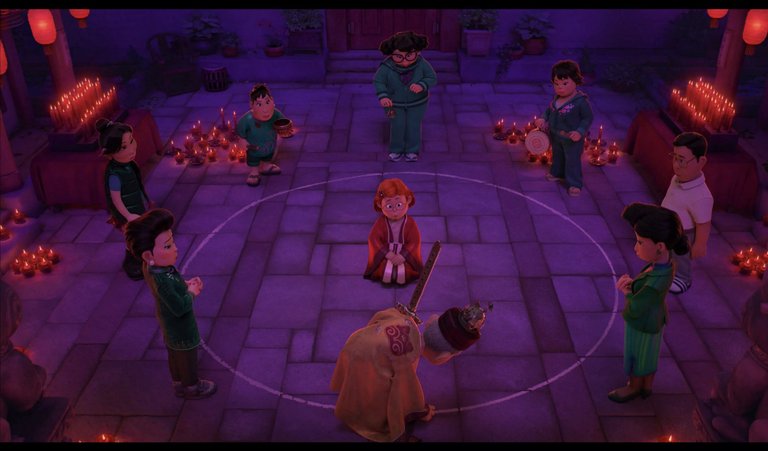
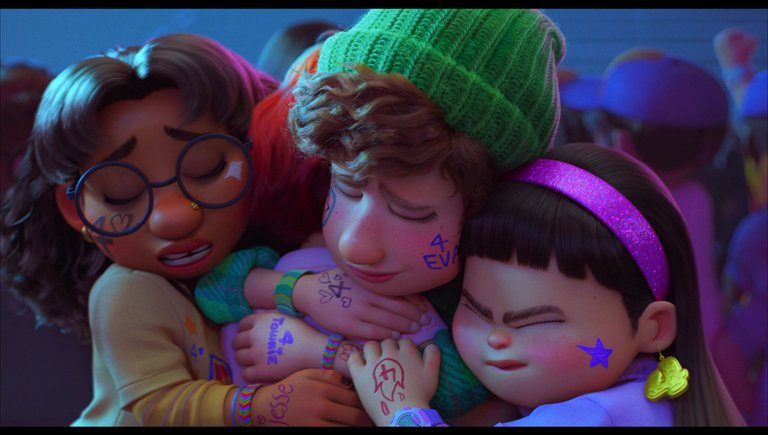
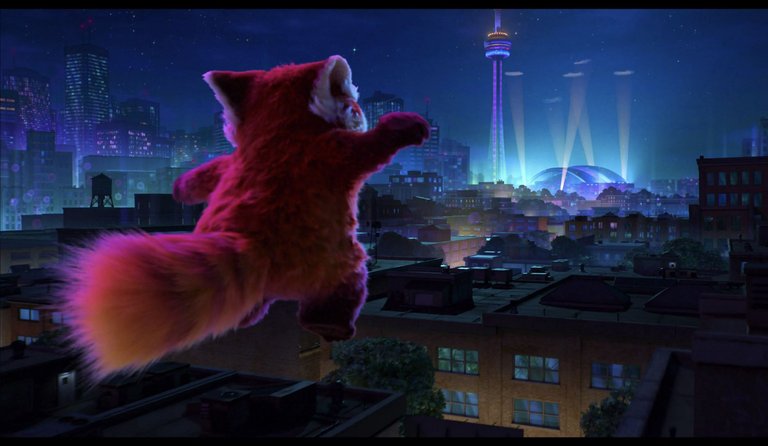
FUENTE-SOURCE1 FUENTE-SOURCE2 FUENTE-SOURCE3
En este momento, Mei Mei se muestra liberada y sin temor. Al quitarse el kimono bajo la luz de la luna, siento que se simboliza la belleza y el bienestar que llegó con la aceptación de su propio ser y la liberación de sus ataduras.
In this moment, Mei is fearless and liberated. Removing the kimono under the moonlight symbolizes the beauty and well-being that come with accepting her true self and breaking free from her restraints.
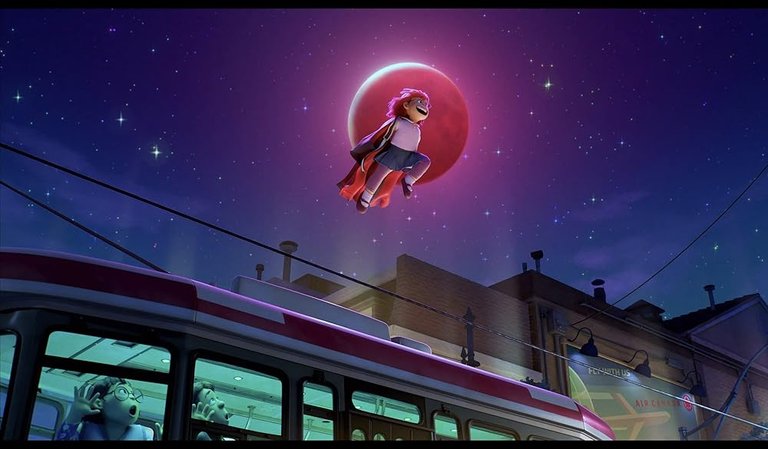
La ira de Ming, sumada a una fisura en su amuleto, libera su gigantesco panda rojo, que arrasa todo a su paso en su búsqueda de Mei en el Skydome (el lugar del concierto) poniendo en peligro a muchas personas y arruinando por completo el concierto. Esta escena para mí evidencia cómo los padres pueden exigir perfección mientras lidian con su propio caos interno, mostrando que no son seres superiores y que no tienen derecho a imponer estándares inalcanzables a sus hijos ni a nadie. Es irónico que Ming rechazara el panda de Mei, omitiendo que el suyo era aún más destructivo.
Ming’s anger, coupled with a crack in her amulet, unleashes her gigantic red panda, which wreaks havoc as it heads to the Skydome (the concert venue) to find Mei, endangering many people and completely ruining the concert. For me, this scene illustrates how parents may demand perfection while struggling with their own internal chaos, showing that they are not superior beings and cannot impose unattainable standards on their children or anyone else. It’s ironic that Ming rejected Mei’s panda, failing to acknowledge that her own was even more destructive.
Mei, harta de fingir y llena de cólera y desesperación se enfrenta a su madre, admitiendo que exponer al panda fue su idea, que le mintió, que le encanta la música ruidosa y los chicos, y le exige que lo supere. Esto empeora la ira de su madre, cuyo panda gigante sigue siendo una gran amenaza, por lo que, su padre, las mujeres de la familia, sus amigas y hasta 4Town colaboran para realizar el ritual y sellar a su panda.
Fed up with pretending, Mei confronts her mother in anger and desperation, admitting that exposing the panda was her idea, that she lied, loves loud music and boys, and demands that Ming get over it. This further fuels her mother’s anger, and her giant panda remains a major threat. Mei’s father, the women of the family, her friends, and even 4Town join forces to perform the ritual and seal Ming’s panda.
• La conexión entre Mei y Ming: transformación y redención • 🩹♥️ • Mei and Ming’s Connection: Transformation and Redemption •
Ming es un personaje algo exasperante: una madre perfeccionista, controladora e intransigente que impone expectativas estrictas sobre Mei, sin respetar sus límites y deseos. Aunque sus métodos son extremos y no siempre apropiados, siento que todas sus acciones carecen de malicia, pues siempre seguía mostrando genuina preocupación y el deseo de proteger a su hija. Aunque no justifico su forma de actuar, esto me conmovió y me llevó a intentar comprender sus fallos y defectos como propios de un ser humano.
Ming is a somewhat exasperating character—a perfectionist, controlling, and strict mother who imposes high expectations on Mei without respecting her boundaries and desires. While her methods are extreme and not always appropriate, I feel her actions lack malice, as she consistently shows genuine concern and a desire to protect her daughter. Although I do not justify her behavior, this moved me and led me to try to understand her flaws as human errors.
El momento más conmovedor ocurre cuando al fin los cánticos y rituales funcionan y Mei y las demás mujeres de la familia son transportadas adentro del espejo. Mei encuentra a una versión más joven y vulnerable de su mamá, quien confiesa entre sollozos: "le hice daño a mí mamá, sentí tanta ira que dejé de tener el control. Ya me cansé de ser perfecta, nunca voy a ser suficiente para ella, ni para nadie". (Escucharon eso? Es mí corazón rompiéndose) Podemos ver el claro diálogo interno de Mei saliendo de la boca de la versión joven de su madre.
The most touching moment occurs when the chants and rituals finally work, and Mei and the other women in the family are transported inside the mirror. Mei encounters a younger, vulnerable version of her mother, who tearfully confesses: "I hurt my mom. I felt so much anger that I lost control. I’m tired of being perfect—I’ll never be enough for her or for anyone." (Did you hear that? That’s my heart breaking.) This scene clearly mirrors Mei’s own internal dialogue expressed through her mother’s younger self.

En un acto de comprensión, Mei le asegura a su madre que la entiende, pero que lo que piensa no es verdad. Ver cómo hija logra entender a su madre es como el gesto que logra la primera conexión real entre ambas en mucho tiempo, creando un punto de partida para que puedan empezar a avanzar juntas.
In an act of understanding, Mei assures her mother that she understands but tells her that what she thinks isn’t true. Seeing the daughter comprehend her mother is the gesture that creates the first real connection between them in a long time, establishing a foundation for them to move forward together.
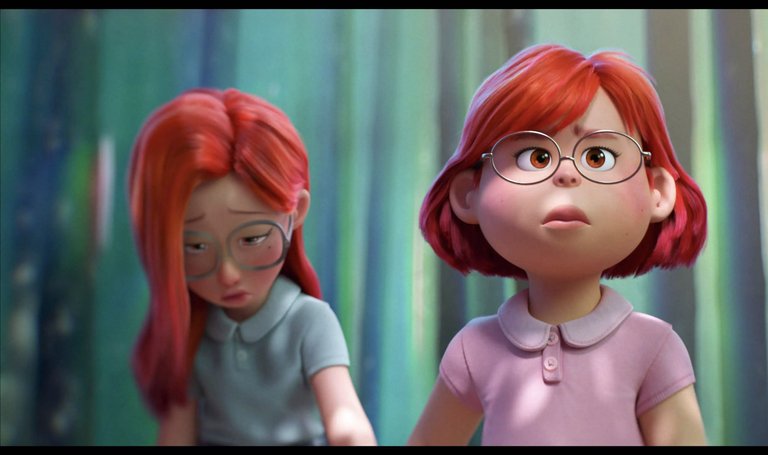
Al final, cuando todas las mujeres de la familia sellan sus pandas, Ming intenta que Mei haga lo mismo. Pero Mei reafirma su independencia, le recuerda que está cambiando y que debe tomar sus propias decisiones, pero que le preocupa que eso las aleje, a lo que la señora Ming asegura que también le preocupa.
At the end, when all the women in the family seal their pandas, Ming tries to convince Mei to do the same. But Mei reaffirms her independence, telling Ming that she is changing and needs to make her own decisions, though she worries this might create distance between them. Ming shares the same concern.
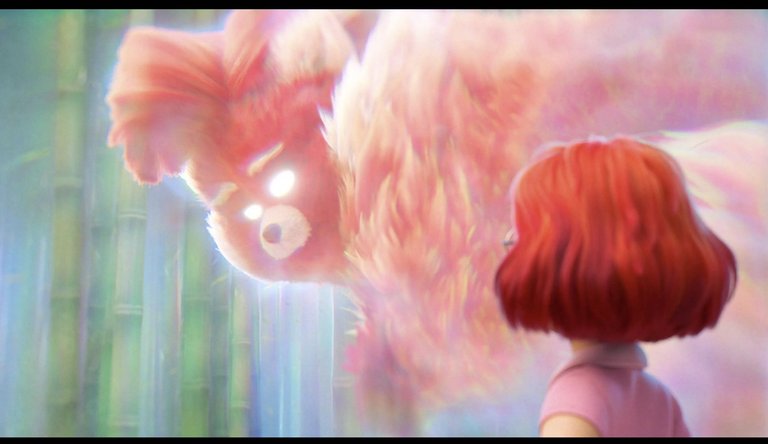
En ese instante, Ming pronuncia con gran conmoción y honestidad una de las frases más liberadoras que he escuchado en mi vida: "...Quieres que todos sean felices, pero eres tan dura contigo misma... Y si yo te enseñé eso... lo lamento. No te contengas, ni por mí ni por nadie. Mientras más lejos llegues, estaré más orgullosa."
In that moment, Ming, filled with emotion and honesty, expresses one of the most liberating phrases I’ve ever heard: "...You want everyone to be happy, but you’re so hard on yourself. And if I taught you that... I’m sorry. Don’t hold back, not for me or for anyone else. The farther you go, the prouder I’ll be."
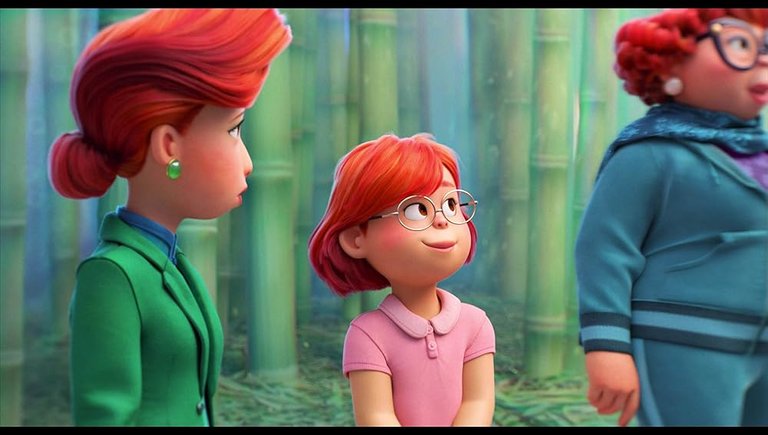
Reconoció lo que su hija sentía, el daño que le hacía, su error, fomentó su libertad de expresión y le ofreció incondicionalidad de apoyo. Acertó, y no pudo haber sido más perfecto, ya que les dió la oportunidad a ambas de sanar lo que les había hecho tanto daño. Con esto pude soltar mí recelo hacia el personaje y sentir mucha satisfacción, se me arrugó por completo el corazón, lo admito.
She recognized her daughter’s feelings, acknowledged the harm she caused, admitted her mistake, encouraged Mei’s freedom of expression, and offered her unconditional support. She got it right, and it couldn’t have been more perfect. She got it right, and it couldn’t have been more perfect, as it gave both of them the chance to heal from what had hurt them so deeply. With this, I was able to let go of my reservations about the character and felt immense satisfaction—my heart completely melted, I’ll admit it.
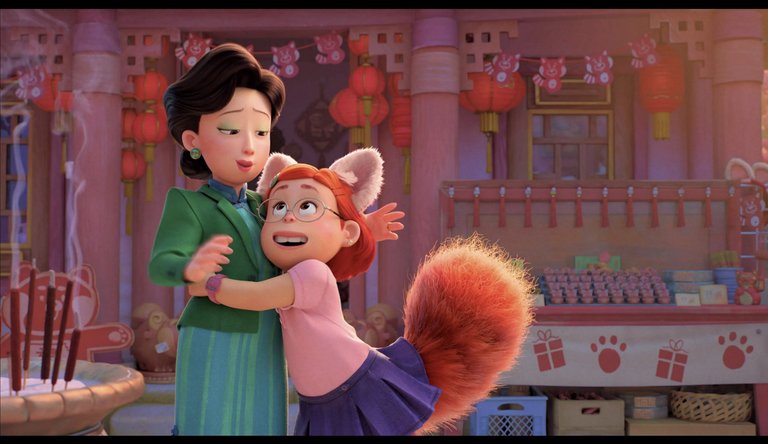
El guión logra conectar a dos personajes opuestos de forma hermosa, generando empatía por ambas partes sin importar de qué lado estemos y eso lo amé.
The script beautifully connects two seemingly opposite characters, fostering empathy for both sides regardless of perspective—a detail I absolutely loved.
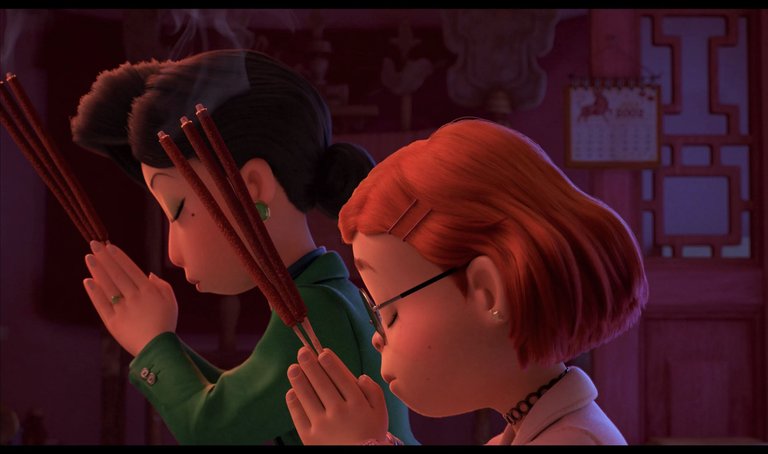
Como mencioné, el panda para mí simboliza una parte esencial de Mei. Y al decidir quedarse con él en lugar de sellarlo, abrazó su caos e imperfecciones, aceptándolos como parte de su identidad sin cuestionar su valor como persona. Algo que sin dudas sé que le ayudó a encontrarse a sí misma y abrirse a su evolución como individuo.
As I mentioned, to me, the panda symbolizes an essential part of Mei. By choosing to keep it rather than seal it, she embraced her chaos and imperfections, accepting them as part of her identity without questioning her worth. This undoubtedly helped her discover herself and open up to personal growth.

• Conclusión • 🏁 • Conclusion •
Se las recomiendo muchísimo. ¿La volvería a ver? Definitivamente sí. Tuvo una muy buena manera de transmitir mensajes buenos que necesitan muchos chicos y padres, explora temas profundos sobre el crecimiento personal, la identidad y la presión familiar. Conecté profundamente con la historia y experimenté muchas emociones y desde la trama hasta la estética y la banda sonora son muy buenas. Para mí tiene un 20/10 asegurado.
I highly recommend this movie. Would I watch it again? Definitely. It conveyed valuable messages that many kids and parents need, exploring deep themes like personal growth, identity, and family pressure. I deeply connected with the story, experienced a wide range of emotions, and found every aspect—from the plot to the aesthetics and soundtrack—excellent. For me, it’s an assured 20/10.
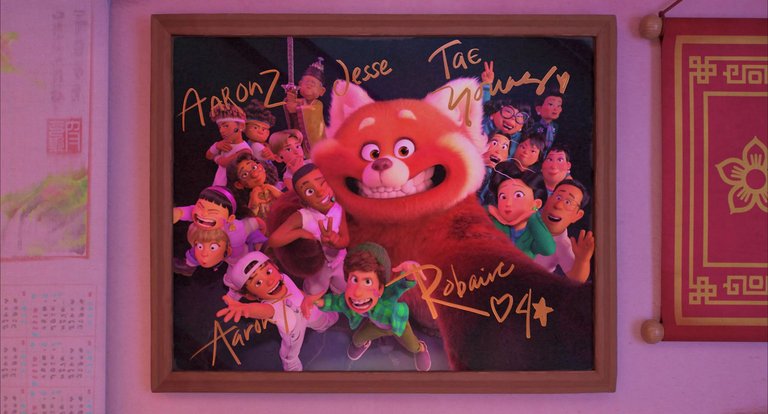
La peli se ve simple, pero trae muchas enseñanzas y reflexiones valiosas, además es divertida. Me encanto esta reseña. 🥰👏🏻👏🏻👏🏻👏🏻👏🏻👏🏻👏🏻👏🏻👏🏻👏🏻👏🏻👏🏻👏🏻
una linda película, buen post!
nice movie, good post!